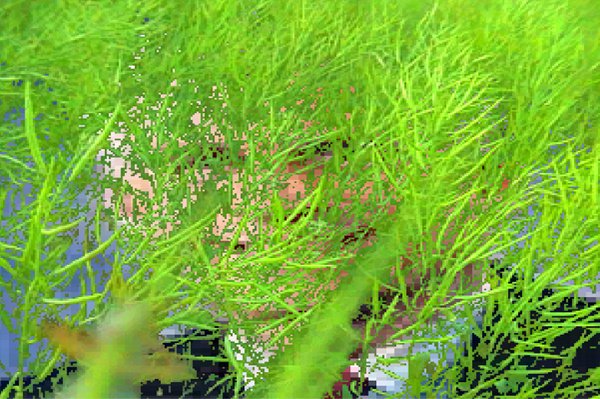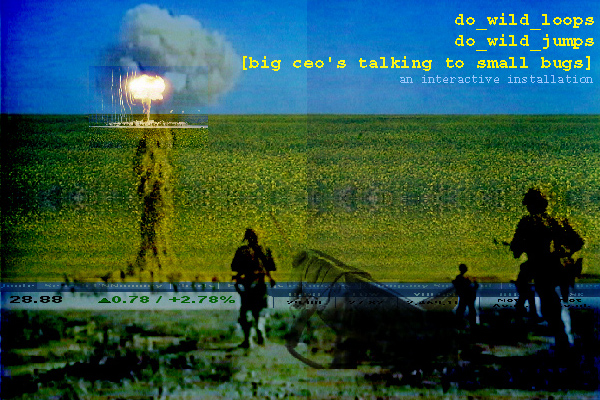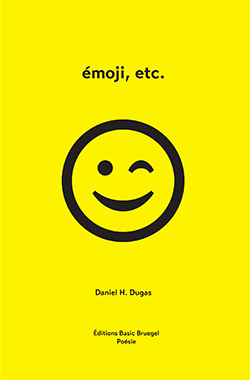do_wild_loops; do_wild_jumps; [big ceo’s talking to small bugs] (2003)
• EMMEDIA, Calgary, Alberta, March 23 -29, 2003
• New Media Research Networks Conference, Charlottetown PEI, March 26-27, 2004
• Ed Video Media Arts Centre , Guelph, ON July 9-23, 2004
do_wild_loops; do_wild_jumps; [big ceo’s talking to small bugs] (2003) from daniel dugas on Vimeo.
related interactive projects: here
Project realized through the A.I.R. program at EMMEDIA in 2003.
In the spring of 2002, scientists were forecasting a severe infestation of grasshopper for Central Alberta. I became interested in seeing how the farmers were going to deal with the situation. The most common solution, insecticide is also the most hard core. Chlorpyrifos, trade name Dursban, Lorsban and others, is primarily produced by the US multinational DOW Agro a subsidiary of the Dow Chemical Company and is used widely throughout the world. Chlorpyrifos, one of about 100 organophosphate insecticides on the market today, is a neurotoxin used to kill insect pests by disrupting their nervous system. The organophosphates were developed during World War Two by Nazi chemists. [1]
According to Dow, Chlorpyrifos, is one of the great success stories in pest control. [2] As The Dow Chemical Company is the main player, I started to look at the company itself; its products, triple bottom-line, history; and the most crucial element of all, its trading values. Dow is known for all sorts of chemistry successes; like the first commercial scale production of bleach in 1898, the production of silicones for the military in the 40’s, the introduction of the revolutionary Ziploc bag (1968), the marketing of the first compact discs (1983), and so on. In 1960, Dow introduced 23 new products. One of them; Agent Orange, would generate enormous profits for the company.
In the 1990’s, Dow Chemical was involved in the silicone breast implants controversy. The Company dodged lawsuits by proving “ … that it only owned half of the breast implant manufacturer Dow Corning Corporation and that they did not develop, test or manufacture silicone breast implants. … ”[3]
In 1999, Dow and the infamous Union Carbide Corporation merged to become the 2nd largest chemical company in the world. Union Carbide Corporation owned and operated the pesticide factory, which caused the worst chemical accident in history. Located in Bhopal, India, over 40 tons of highly poisonous methyl isocyanate gas leaked out of the plant at midnight on December 2, 1984. More than 8,000 people died in the immediate aftermath of what is known as the ‘Chemical Hiroshima’. 10 more are dying every month due to exposure-related diseases. At present, Dow is divesting itself of any moral and financial responsibility related to this tragedy. [4]
May the force be with you
Through my research, I learned that one of the basic ways to curb the grasshopper population is to clean the ditches alongside of the roads, and to turn over the soil in the fields. The process uproots and exposes grasshopper eggs, to greatly reduce infestations. These solutions might be viewed as rather sissy compared to the product solutions proposed by the industry: Lorsban 4E, Warrior T, Capture 2EC, etc.
Some of those products, and especially the Genetically Modified Organisms are re-writing ecology FAST FORWARD. The desire to master the world has never been so tempting, while the power to resist such changes remains limited at best. A quote by Dr. Denis Waitley, Productivity Consultant for Monsanto, one of Dow’s largest competitors, sums up the situation in a very sanitized manner, “There are two primary choices in life: to accept conditions as they exist, or accept responsibility for changing them.” [5]
I became interested in the interaction and the power relation between the “head” and the “tail”, the CEO’s and the bugs, decision makers and individuals. Dow has a Leadership web page with a thumbnail photo and a biographic description for each of its executives. I have copied and pasted everybody who’s somebody and I gave them a big cushy leather executive chair right in the middle of my project. For several years, the focus of my work has been related to the economy. Boom and bust alike. One economic tool that I have followed with regularity is the Map of the Market, [6] which provides a colour coded map of current market values. This visual aid was inspirational for the do_wild_loops’ project.
Working with the Cycling74 MAX/MSP and the Jitter programs, I set up a series of mechanisms to download financial information from The Dow Company (the latest price of a share, the percentage change and the dollar change of a share), setting up a custom “map of the market.” I use this information to affect and inflict changes on the selected movies, images and sound files inside the program. I created a structure where the visitors could re-write, if not history, at least the biographies of the Leaders. Visitors to the exhibition can select and erase a biography, write a new one and upload it onto the server hosting where the project’s website.
1 -Organophosphate: https://en.wikipedia.org/wiki/Organophosphate
2 – Chlorpyrifos helps: http://www.dowagro.com/chlorp/about/over.htm
3 – Breast-Implant Verdict Reversed by Appeals Court: http://www.dow.com/dow_news/corporate/2002/20021209a.htm
4 – For more on information see audio file doww19.aif
– For more information on Bhopal: http://www.bhopal.net/index.php
5 – Monsanto Products Overview: http://www.monsanto.com/monsanto/layout/products/default.asp
6 – SmartMoney.com: Map of the Market :http://www.smartmoney.com/marketmap/
7- Kamandi, The Last Boy on Earth Vol. 2. No. 12. Dec 1973. Published by National Periodical Publications Inc. N.Y. N.Y.
(revised May 29, 2017)
Leave a comment
Daniel H. Dugas
Archives
Blogroll
- A.I.R. Vallauris
- ACAD
- Adobe additional services
- Adobe Creative Cloud
- AIRIE
- Amaas
- Amazon Author Central
- ARTothèque
- Australian Poetry
- Basic Bruegel
- Bitly
- CCCA
- CDBaby
- Cycling 74
- Dissolution
- Éditions Prise de parole
- Emmedia
- eyelevelgallery
- FAVA
- Festival acadien de poésie
- Festival FRYE Festival
- FILE – Electronic Language International Festival
- Freeware list
- Fringe Online
- Galerie Sans Nom
- Gotta Minute Film Festival
- Instants Vidéo
- JUiCYHEADS
- Kindle Direct Publishing
- Klondike Institute of Art and Culture
- La Maison de la poésie de Montréal
- La Maison de la Poésie et de la Langue française Wallonie-Bruxelles
- Laboratorio Arte-Alameda
- Le Centre Jacques Cartier
- Liberated Words
- Maison Internationale de la Poésie – Arthur Haulot
- MediaPackBoard
- Miami Book Fair International
- Monoskop
- Mot Dit
- NSCAD University
- Paved Arts
- PoetryFilm
- Portail des auteurs du Nouveau-Brunswick
- RECF
- Revue Ancrages
- Salon du Livre du Grand Sudbury
- Sculpture Space
- Subtropics.org
- Sydney college for the arts
- The Centre for Contemporary Canadian Art
- The New Gallery
- Trevigliopoesia
- tumbler-documents
- V Tape
- Valerie LeBlanc
- VideoBardo
- Void Network-Κενο Δίκτυο
Categories
- #covidpoèmes
- Advertisement
- AIRIE
- Ancrages
- anthology
- Anthropocene
- Architecture
- Around Osprey
- art
- Article de presse
- arts visuels
- audio
- Australian Poetry
- Basic Bruegel Editions
- Book
- book fair
- Cafe Poet Program
- Ce qu'on emporte avec nous
- Citations gratuites
- Collaboration
- commentaire
- commentary
- Compte rendu
- conférence
- Conservation Foundation of the Gulf Coast
- COVID-19
- Critique littéraire
- culture
- Daniel Dugas
- Design
- Édition Michel-Henri
- Éditions Perce-Neige
- Éloizes
- Emmedia
- emoji etc | émoji etc
- Environnement
- essai
- essay
- Everglades
- Exhibition
- festival
- Festival acadien de poésie
- Festival Frye Festival
- FIPTR
- Flow: Big Waters
- Fundy
- Habitat
- installation
- Instants Vidéo
- interactivity
- journal
- JUiCYHEADS
- Kisii
- L'Esprit du temps
- laptop
- Leaving São Paulo
- lecture
- Livre
- logos
- Magazine
- Miami Book Fair
- Moncton 24
- novel
- OASIS
- oil spill
- perception
- performance
- Photo
- poésie
- Poetic Licence Week
- Poetry
- politics
- politique
- press
- Prise de parole
- Revue Ancrages
- salon du livre
- sculpture
- Sculpture Space
- sound
- Souvenirs
- Spirit of the Time
- Style & Artifacts
- Symposium d'art/nature
- talk
- television
- The New Gallery
- Uncategorized
- Valerie LeBlanc
- vidéo
- vidéopoésie
- Videopoetr/Vidéopoésie
- videopoetry
- visual arts
- What We Take With Us
- youth literature









